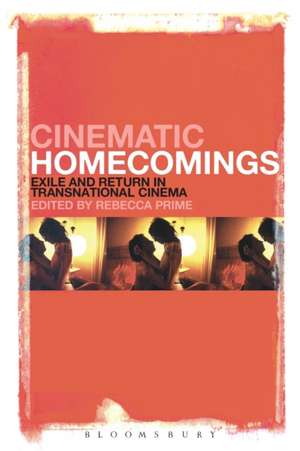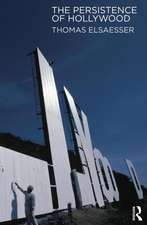Cinematic Homecomings: Exile and Return in Transnational Cinema
Editat de Dr Rebecca Primeen Limba Engleză Paperback – 18 mai 2016
| Toate formatele și edițiile | Preț | Express |
|---|---|---|
| Paperback (1) | 259.25 lei 6-8 săpt. | |
| Bloomsbury Publishing – 18 mai 2016 | 259.25 lei 6-8 săpt. | |
| Hardback (1) | 834.12 lei 6-8 săpt. | |
| Bloomsbury Publishing – 14 ian 2015 | 834.12 lei 6-8 săpt. |
Preț: 259.25 lei
Preț vechi: 332.08 lei
-22% Nou
Puncte Express: 389
Preț estimativ în valută:
49.61€ • 51.90$ • 41.21£
49.61€ • 51.90$ • 41.21£
Carte tipărită la comandă
Livrare economică 03-17 aprilie
Preluare comenzi: 021 569.72.76
Specificații
ISBN-13: 9781501319952
ISBN-10: 1501319957
Pagini: 336
Ilustrații: 30 bw illus
Dimensiuni: 152 x 229 x 27 mm
Greutate: 0.45 kg
Ediția:NIPPOD
Editura: Bloomsbury Publishing
Colecția Bloomsbury Academic
Locul publicării:New York, United States
ISBN-10: 1501319957
Pagini: 336
Ilustrații: 30 bw illus
Dimensiuni: 152 x 229 x 27 mm
Greutate: 0.45 kg
Ediția:NIPPOD
Editura: Bloomsbury Publishing
Colecția Bloomsbury Academic
Locul publicării:New York, United States
Caracteristici
First collection to provide a wide-ranging comparative approach to this understudied phenomenon.
Notă biografică
Rebecca Prime is a film historian whose publications include Hollywood Exiles in Europe: the Blacklist and Cold War Film Culture (2014). A Fulbright scholar, she holds degrees from Columbia University, New York University, and the University of California, Los Angeles.
Cuprins
AcknowledgementsIntroduction - Rebecca Prime, Hood College, USAI. Transatlantic Modes of ProductionCome Back to Erin: Themes of Exile and Return in the "O'Kalem" FilmsPeter Flynn, Emerson College, USAAlexander Korda and Peter Lorre: Central European Exile and the Illusion of ReturnCatherine Portuges, University of Massachusetts, Amherst, USAFrom Blacklists to Black Films: The Hollywood Radicals Return HomeRebecca Prime, Hood College, USAII. Nostalgic Visions, Imagined HomelandsBetween Longing and Belonging: Diasporic Return in Contemporary South Korean CinemaWe Jung Yi, New York University, USAThree Ages of Russian Nostalgia: Nostalgia, Window to Paris, and Brother 2Milla Federova, Georgetown University, USABeyond Return in Turkish Diasporic CinemaSilvia Kratzer, UCLA, Chapman University, Pepperdine University, USAIII. Exilic Subjectivity and the Politics of ReturnStaying Home: Cuban Exile Film from WithinMariana Johnson, University of North Carolina-Wilmington, USA Chilean Exile Cinema and its Homecoming DocumentariesJosé Miguel Palacios, New York University, USA Burning Straw Men: The 1979 Revolution and Bahman Farmanara's Stubborn CosmopolitanismMatthew Holtmeier, Western Washington University, USAIV. Re-visioning the PastReturning to Rubble: Fritz Kortner's The Last IllusionMartina Moeller, Université Mohammed V in Rabat, MoroccoHealing Journeys: Return as Therapy in Walk on WaterIdo Ramati, Hebrew University of Jerusalem, IsraelV. The Roving GazeNarratives of Return in the Films of Ousmane Sembene and Djibril DiopMalini Guha, Carleton University, CanadaSleeping with Strangers: Queering Home and Identity in I Don't Want to Sleep AloneKai-man Chang, Tulane University, USAA Moroccan Homecoming: The Fabulation of Family and Home in Izza Génini's Retrouver Oulad MoumenStefanie Van de Peer, University of Stirling, UK Zero Degrees of Separation: Post-Exilic Return in Denis Villeneuve's IncendiesClaudia Kotte, Humboldt University, GermanyAfterword - Dina Iordanova, University of St. Andrews, UK ContributorsIndex
Recenzii
Rebecca Prime succeeds at assembling [the] texts in a flow that looks at nostalgia, identity, belong, State power and expectations from multiple angles, allowing complexity to unravel its layers in pleasurable readings.
A valuable tool for researchers in the field ... This volume is a significant contribution to a growing field, offering fresh insight into postexile and home, identity, and cinema both theoretically and within distinct contexts.
A significant and timely contribution to the growing field of transnational cinema studies, this collection explores new directions and lines of inquiry into post-exilic narratives of return. Extending in scope from the silent era to the present, the essays gathered here bring a much-needed historical perspective to current debates about immigration, diaspora, and globalization.
Rebecca Prime has put her finger on an intriguing blank spot among filmic topoi-the point of return, when the much-studied figures of exile, loss, nostalgia, and alienation are confronted with the persistent geopolitical realities of "home." She shows not only how this trope brings to light many less known films and filmmakers, but also how it can refine and energize current thinking about national, transnational, and world cinemas. Admirably assembled, often with original documentation, Cinematic Homecomings is well worth its price and place on any film studies bookshelf.
The chapters of this comprehensive anthology engage with canonical texts and theories of exile, diaspora and migration and make a compelling case for expanding the concept of exile beyond its original meaning of banishment from one's homeland to encompass other forms of transnational mobility that lead away from and back to a real or imaginary origin. Nuanced close readings of a wide range of films from different eras, countries and continents demonstrate with admirable clarity that (post-)exilic cinema is characterised by a distinctive affective and aesthetic response to this particular mode of dislocation. Cinematic Homecomings is a timely contribution to the buoyant field of transnational film studies and will serve as an excellent compendium for students and scholars for many years to come.
A valuable tool for researchers in the field ... This volume is a significant contribution to a growing field, offering fresh insight into postexile and home, identity, and cinema both theoretically and within distinct contexts.
A significant and timely contribution to the growing field of transnational cinema studies, this collection explores new directions and lines of inquiry into post-exilic narratives of return. Extending in scope from the silent era to the present, the essays gathered here bring a much-needed historical perspective to current debates about immigration, diaspora, and globalization.
Rebecca Prime has put her finger on an intriguing blank spot among filmic topoi-the point of return, when the much-studied figures of exile, loss, nostalgia, and alienation are confronted with the persistent geopolitical realities of "home." She shows not only how this trope brings to light many less known films and filmmakers, but also how it can refine and energize current thinking about national, transnational, and world cinemas. Admirably assembled, often with original documentation, Cinematic Homecomings is well worth its price and place on any film studies bookshelf.
The chapters of this comprehensive anthology engage with canonical texts and theories of exile, diaspora and migration and make a compelling case for expanding the concept of exile beyond its original meaning of banishment from one's homeland to encompass other forms of transnational mobility that lead away from and back to a real or imaginary origin. Nuanced close readings of a wide range of films from different eras, countries and continents demonstrate with admirable clarity that (post-)exilic cinema is characterised by a distinctive affective and aesthetic response to this particular mode of dislocation. Cinematic Homecomings is a timely contribution to the buoyant field of transnational film studies and will serve as an excellent compendium for students and scholars for many years to come.









